A new case has just reached the U.S. Supreme Court that explores the constitutionality of state laws that force religious employers to violate their deeply held beliefs about abortion. A group of faith-based organizations, which includes religious orders, churches, and services organizations, is challenging a 2017 New York state regulation that requires religious employers to provide funding for “medically necessary” abortions in their company health plans.
The law doesn’t define “medically necessary,” but the state has asserted, at a minimum, the term would include rape, incest, or fetal malformation. That last category could include preborn babies diagnosed with Down syndrome or other conditions.
The law was upheld in the lower state courts in the Empire State, and its highest appellate court recently refused to hear the case. The Becket Fund for Religious Liberty, representing a varied group of faith-based organizations, has petitioned the Supreme Court to take up the appeal.
At issue is whether the New York regulation meets the test for a “neutral law of general applicability.” That’s a legal test created by the U.S. Supreme Court in 1990, which reflects the high court’s constitutional understanding of the religious clauses of the First Amendment. In practice, the high court typically says that religious organizations can be bound by the same laws that everyone else is, even given that the First Amendment protects the “free exercise of religion.”
However, a law is not “neutral” or “generally applicable” if it doesn’t apply to everyone. In other words, if the state grants exemptions to the law to various entities but not to religious entities, the law shouldn’t pass the test. But in this case, the New York state courts ruled that the exemptions the state granted didn’t jeopardize the regulation’s status as neutral or generally applicable.
To make matters more complicated, New York exempted some religious organizations from the regulation – those that exist primarily to inculcate believers, and employ and serve mainly co-religionists. That means that any missions-minded church or religious organization that serve the general community via charitable services would not be exempted.
But the church exists to serve the unchurched, and New York’s attempt at differentiating between the mission arm of the local church and a house of worship for the purpose of granting exemptions makes no sense, either as a matter of religious doctrine or constitutional law. However, New York pressed on with its dubious regulation and the state courts upheld it as constitutional.
There is a déjà vu’ aspect to this story, as this case involves another government entity attempting to force nuns to pay for abortion. One of the religious organizations in the case is a group of Anglican nuns.
“Our faith tells us that every life is precious from the moment of conception to the final breath. That’s why we spend our lives praying and serving to lift others’ burdens,” said Mother Miriam, of the Sisterhood of Saint Mary, in a Becket press release. “New York has told us that if we want to hold our beliefs about the sanctity of life, we have to stop serving non-Anglicans. We cannot compromise on our religious beliefs, or in our service to people of all faiths or no faith at all. That’s why we need relief from the Supreme Court.”
Becket lawyer Lori Windham sees clear parallels between this case and the ongoing court battles involving the Little Sisters of the Poor, who fought the Obama-era contraceptive mandate issued by the U.S. Department of Health and Human Services that forced religious organizations to pay for abortion coverage under Obamacare. That case has been up to the Supreme Court a couple times already.
“When New York instituted its abortion mandate, the Little Sisters of the Poor were already two Court victories into their battle against the contraceptive mandate. Now they’ve won for a third time, sending the clear message that the government can’t make nuns do its dirty work,” said Windham. “New York’s failure to learn from the Little Sisters’ saga that you can’t make nuns pay for abortions is beyond reason.
“The Court needs to step in and teach New York that lesson.”
The case is Roman Catholic Diocese of Albany v. Lacewell.
Photo from Becket Law






